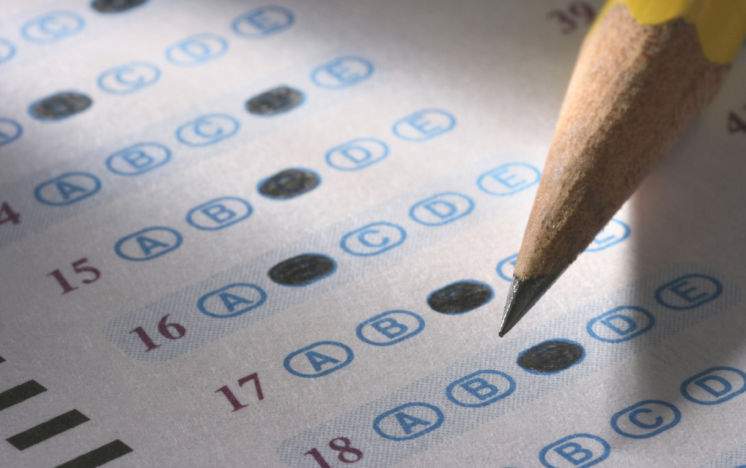Pitt branch campuses become test-optional temporarily, highlighting concerns over standardized exams
More than 50 colleges and universities across the country dropped their ACT/SAT requirements for next year’s applicants.
April 12, 2020
Seamus McDevitt, a junior at City Honors School in Buffalo, New York, plans on applying to Pitt in the fall, but because of cancellations due to the coronavirus pandemic he hasn’t been able to take the SAT or ACT yet — a requirement at Pitt.
“My school pays for juniors to take the SAT in May and we’re not taking it now,” McDevitt said. “I want to apply for the Honors College and that’s due Nov. 1. The latest I could take it, I guess, is Oct. 3, but that’s way too close for comfort.”
In the wake of the coronavirus pandemic, high school juniors face a changing college admissions process. Due to stay-at-home orders issued in many states, the College Board and ACT canceled spring administrations of their tests. In response, more than 50 colleges and universities across the country dropped their ACT/SAT requirements for next year’s applicants.
Pitt’s main campus will not join this list, though the Bradford, Greensburg, Johnstown and Titusville regional campuses will temporarily become test-optional for fall 2020, the University announced last Thursday. Joseph McCarthy, the vice provost for undergraduate studies, said if a prospective regional campus student chooses not to send a standardized test score, the admissions committee will rely more heavily on other parts of their application. These other factors include a student’s academic coursework, grade trends, senior year curriculum choices, performance in advanced courses, essay questions and extracurricular activities.
The decision to not require scores at branch campuses won’t affect need-based financial aid programs, like the Pitt Success Pell Match Program, but it could factor into merit-based scholarship eligibility.
Kellie Kane, an associate vice provost for enrollment and executive director of admissions, said switching to test-optional is a complicated decision that takes a long time to finalize.
“That process is a lengthy one to consider,” Kane said. “By allowing the regional campuses to lead the way in this effort, the Pittsburgh campus will be able to study the effects and consider appropriate changes to policy.”
She added that Pitt will consider effects from the pandemic in making changes to the fall 2021 admissions cycle.
“The criteria are updated every year based on feedback from students and families, faculty and deans, as well as administration who weigh in on classroom and residential space,” Kane said.
But fall 2021 might be too late for Caroline Dawson, a junior at Pine-Richland High School, located about 30 minutes north of Oakland. Dawson said she is planning to apply to Pitt, but she hasn’t taken the SAT or ACT yet — something that she worries about frequently now.
“I feel a bit pressured to get the SAT/ACT scores done as soon as possible but I wonder how and when I will be able to do this,” Dawson said. “Pitt and other universities should make their application requirements more relaxed in light of this pandemic because it has affected most, if not all, of high schoolers.”
Provost Ann Cudd said switching the policy at only the branch campuses will serve as an experiment for whether or not to permanently adopt the policy.
“This pilot program for the regional campuses will be an interesting experiment and only fair under the circumstances,” Cudd said. “It will provide a nice opportunity for Pitt to evaluate the impact of going test-optional.”
McDevitt said he thinks all universities should make their applications test optional, and he doesn’t understand why only the branch campuses at Pitt were switched.
“That seems weird to make your branch campuses test-optional, but not the main one,” McDevitt said. “For the sake of people who don’t have the amount of time to go out and take these tests as last year, I think it should be changed.”
He said Pitt’s decision to require scores won’t deter him from applying, but it might deter him from attending.
“It might change my chances of going especially if I don’t have a test score or I only have one chance to take it,” McDevitt said.
But not all high school students agree with completely eliminating standardized tests in the wake of the pandemic, in part because extracurricular activities are also cancelled. Will Sangpachatanaruk, who is also a junior at Pine-Richland, said he is relying on his test score after the NCAA cancelled soccer recruitment. According to ESPN, the NCAA suspended on-campus and off-campus recruiting for all Division I sports through at least April 15.
“The coronavirus has halted all recruitment across the country, so I can no longer hope that soccer can get me into the competitive schools that I am looking at,” Sangpachatanaruk said. “I don’t think Pitt and other universities should make their requirements more relaxed because, as a junior, most of my academic achievements are still extremely relevant.”
Sangpachatanaruk added that he is biased because he already took the test unlike many of his peers, but he thinks they will have another opportunity.
“I am also biased towards grades and test scores because I lack extracurricular activities other than my sport,” Sangpachatanaruk said. “Juniors still have opportunities to take it next year once, hopefully, the pandemic is resolved. The downtime could be used to prepare for the big standardized tests.”



